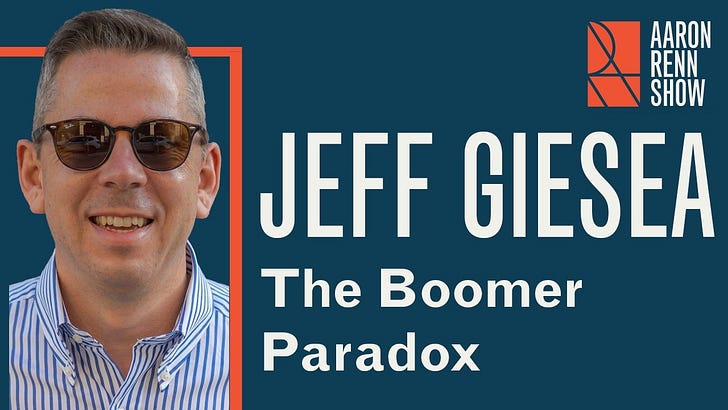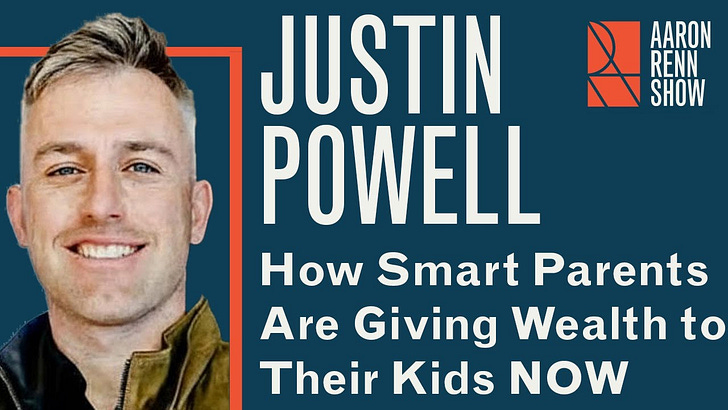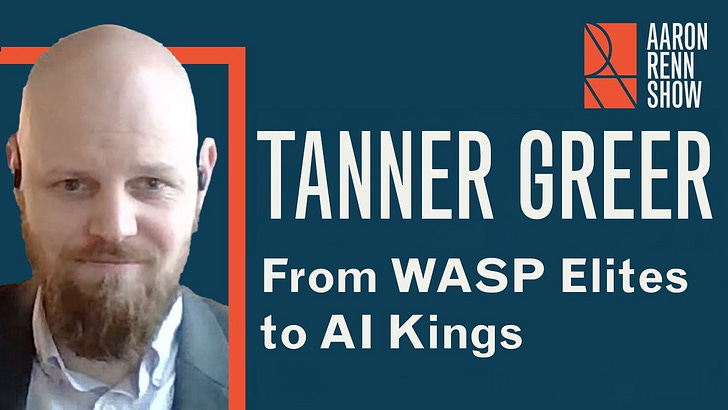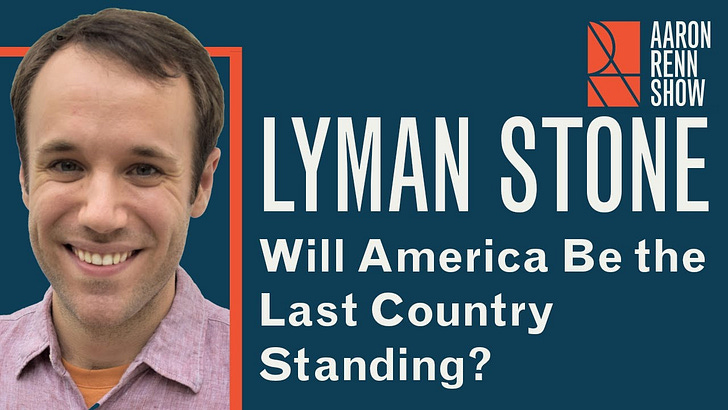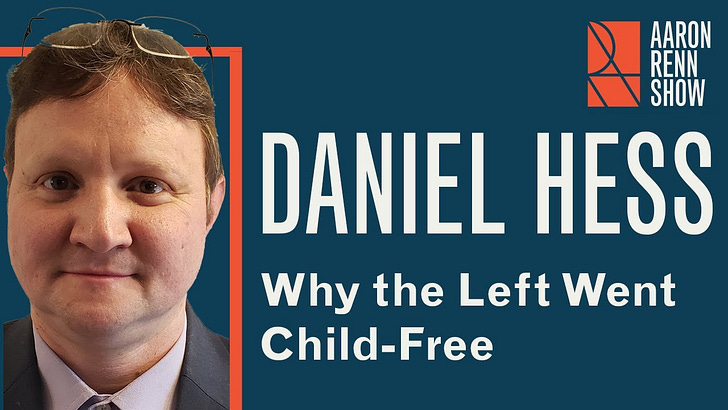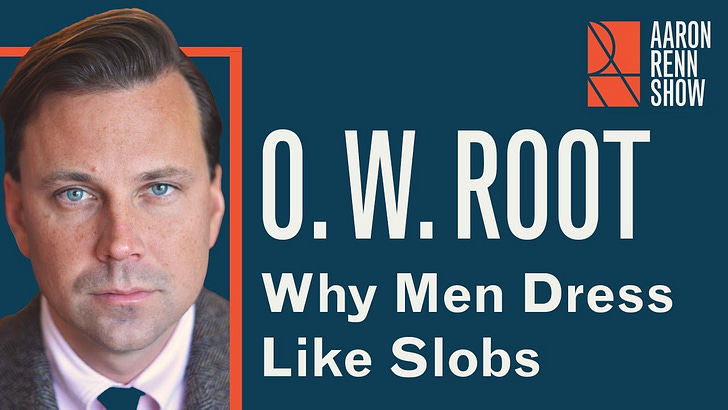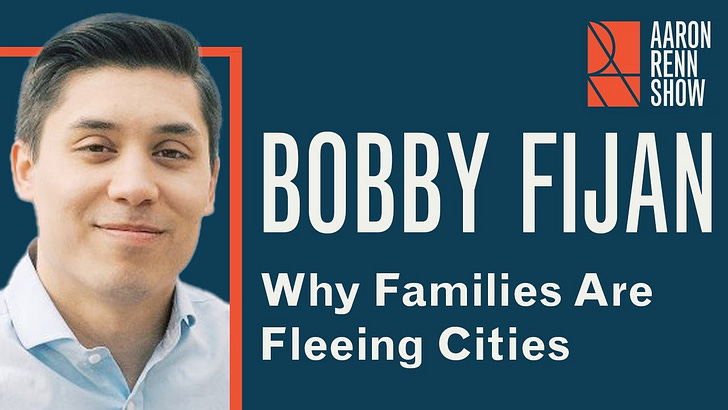Normally, podcast transcripts are only available to paid subscribers. But this week I had a very special guest, Sen. Marco Rubio of the state of Florida, to talk about his office’s new study on the state of the working (and non-working) man. So I’m sending the video and transcript out to everybody.
To get the transcripts of all my new podcasts, exclusive content, and commenting privileges, become a subscriber today.
Interview Video:
Podcast Transcript:
Aaron Renn: Hello, I'm Aaron Renn, and I am honored to be joined today by a very special guest, Senator Marco Rubio of the great state of Florida. Senator Rubio, thank you so much for taking so much time out of your very busy day to speak with me today.
Sen. Marco Rubio: I'm glad to do it. I'm happy to have this conversation.
Renn: I asked to interview you because you just put out through your office a new report called “The State of the Working (and Non-Working) Man.” I thought it was a really great report, maybe the best I've seen on the topic. So congratulations on what's a very good, if often sobering study.
Sen. Rubio: Well, look, I mean, I think by and large it was another way to talk about sort of a central problem we have, and that is we made a series of economic decisions over the last 30 years, grounded in the belief that when it came to the economy and national life, nationhood no longer mattered. That it didn't matter where the jobs were located, per se, or even what industries we had. That efficiency was all that mattered.
And look, I believe in free enterprise 100%. I despise socialism, because free enterprise is going to give you the most efficient outcome where money should move and where jobs should be, and so forth. But what we forgot is, from time to time the most efficient outcome may not be in the national interest. We completely do away with the national interest arguments. So it is more efficient to make some of these things in China or India or Vietnam or wherever. But it's not in our national interest to wipe out entire industries and the jobs that sustain the American middle class, the reliable, dignified, good paying jobs that didn't just provide a paycheck, they allowed people to do things like own a home and help build communities and retire with dignity. And gave them the sort of stability. And they could do it without having a college degree or advanced PhD or something.
And I think that really is at the fundamental core of this is that we created an economy where it is virtually impossible, and increasingly impossible for someone who doesn't just have a college degree, but the right degree, in the right field, living in the right city somewhere in coastal America or some research hub, to earn a living that allows them to have some of the things that were accessible to working Americans just a generation or less ago. And that begins to break everything down. Because now people don't get married. Now people see that just your willingness to work hard is not enough. And from it spins off things like opiate addiction, Rust Belt destruction of entire communities, less children being born, families being broken apart - all these other pathologies that follow.
So we've got to make sure again that the creation of good, stable jobs for people that don't have advanced degrees is a national interest again, and it's taken into account when we're balancing out economic decisions.
Renn: Yes, the statistic that you put in there that really struck me is that there are seven million prime working age men - that’s seven million men ages 25 to 54 - who are not in the labor force. That is, they're not even looking for work. And as you know, economists like Alan Krueger have really shown that that triggers all sorts of negative spirals for those people, in terms of suicides, not being able to get married, social isolation. And that's just the tip of the iceberg in terms of what's going on.
Sen. Rubio: So - and I'm not a sociologist - but I think there is a sociological component to that happening for some reason. I think that whether it's a lack of positive masculine or male role models, or some other things that might be going on in our culture and society, I think that contributes to it somewhat. And there's limits to what we can do in public policy about that, because culture and society is something that has to be taken care of at the community, and especially the family level. And that's why those things are - that's why you can't have a successful country if you don't have strong families and strong communities. And government should be supportive of them, but it certainly can't replace them. And in many cases, when government tries to get involved with family and community, it makes it worse.
But there is an aspect that has to do with public policy. And that is the aspect that that says yes, if you are able bodied, you have an obligation to work. But we also have to have an economy that has an obligation to create that work. In essence, we can demand that people who are able bodied work, but we also have to make sure that it's an economy that's providing that kind of work. And that's why when you see these employment numbers that are put out, okay, those employment numbers tell you that some job was available somewhere and the employer couldn't find someone to take it. What they don't tell you is, well what kind of job are we talking about? Is it a job - is it a seasonal job, is it a job that these people have already done ten times and every single time they do it, they after three months, they get laid off, they get fired - it's temporary. But the idea that - but it doesn't measure: Are these reliable, stable jobs that allow you to say, okay, now I have enough confidence that I can get married, that I can have kids, that I can buy a home, or that I can invest and root myself in a community? And that has not been part of our economic conversation. It’s not been part of the equation. We talked about GDP growth, about how the markets are doing on any given basis. We talked about all these economic models. But this other stuff isn't talked about at all. It's not part of our economic consideration when making these decisions. And that has to change.
Renn: I really appreciated that one of the things you did in here is make it clear that there should be an expectation on able bodied men that they do work. So often, we fall into one of two camps, either it's, you know, you just need to man up and get a job, or it's, you know, oh, woe is the poor people over here. And I think what you're saying is, yes, we need to address the structural factors, but without changing the fact - which I agree with - that men should be expected to work.
Sen. Rubio: Yeah, there's no doubt. So if you think about it, part of it is there's this expectation, right, that you should be working like - you should, if you're able to work, you should work. And a lot of the people that aren't will tell you well, all the jobs that are available are not good enough, they don't pay enough, I don't like the job, I don't enjoy it, and so forth. But there is an obligation at some point to go out and work. By the same token, I think we have an obligation to have an economy that produces the kind of work that people are enticed to do. And so there's a big difference between saying, go work in a service sector where you're literally flipping from one job to the next every three to four months, and go work somewhere where if you're willing to put in the time, you can increase your pay, and eventually one day retire, and have a retirement, being able to retire with some dignity. And you know that company, and you know that employer is going to be there today, they're going to be there tomorrow, they're going to be there 10, 15, 20 years from now. That the stability that comes with that then allows you to do all these other things. And building all these other things is so important to the country.
We have to have an obligation in ensuring that that is a national interest, right? And that's been completely devoid, because right now all of the economic conversation is simply about from a pure economic market analysis, meaning what is the most profitable thing that we can have in our economy? Or what is the thing that will lead to the fastest growth in wealth, without any consideration for what are the opportunities that that's creating? What are the other factors that are just as important as GDP growth - which is very important - but there are other factors associated with it.
It's not just - maybe this is a bad example - but you can add ten pounds of muscle or you can add ten pounds of fat. They’re two different weight gains, right? And it's the same with the economy. You can grow, but if that growth is not the kind of growth that also fuels middle class opportunity for people that aren't looking to become billionaires, they're just looking to have the kind of life their grandfather had and their father had. And if you're not doing that, then you're going to have some real serious problems in your society and see families break down and all these other things that we now see, and that we've been bedeviled by.
Renn: Yes, we're a people who has an economy, not an economy that happens to have some people attached to it.
Sen. Rubio: And we have an economy, we have a market economy, but the market is a tool to serve the national interest and the common good, not the national interest and the common good to serve the market. At the end of the day, my, our job is to make sure that yeah we have a market economy, because it's the greatest producer of opportunity in human history of all the models have ever been tried. But it has to be a market economy that's used as a tool to strengthen the country and serve our national interest in the interest of our people, not the other way around, where we're all bending over backwards and sacrificing the national interest, or the good, the common good for our people, in order to serve a market outcome. I think we've gotten backwards.
Renn: Yes. You talked in there, not just about the problems, but also about the solutions. You mentioned deindustrialization. And clearly you call for re-industrializing America. One that I thought was interesting was the “Support America's Protectors” initiative, which really, I think, dovetails with some of the needs that we have in our society. Could you talk a little bit about that?
Sen. Rubio: Well, by the protectors, we're talking about jobs that many would call first responders: police officers, people in the military, border patrol agents, and so forth. And obviously, we know about all the strains and things that have been said about it. But if you look at recruitment numbers, particularly in the military, but also some of these others, they're really down. And they're down for the same reason. And what, traditionally, demographically - who are the people that fill these jobs predominantly? Where was the base of the recruits? It came from able bodied men between the ages of 25 and 30, you know, 18 to 25, whatever, that went into that.
Now, why are they not going into it? There's a lot of reasons. It is hard work. It's not for everybody. Now, the second is some of the demonization of these professions that we've seen over the last few years, particularly law enforcement, I think have made it - or have made people either less willing to be a part of it because they agree with the demonization, or are less willing to be a part of it because they don't want to be demonized. You know that. And then the third I think, and some of it surrounds - you think about it for a moment. I had someone say this to me. Once and again, I'm not claiming that this is a scientific experiment, but it's anecdotal I'm sharing with you. But I've had a number of young people say, why would I join the military? Look how they treat their veterans. Because there are stories about homeless veterans and veterans that are suffering and the fights they have to have with the VA to prove that their injuries are service related, and so forth. So when that's how you treat people that have served you, it doesn't exactly make you an attractive place.
For a lot of different reasons, those jobs are not being protected. And those are important because those are the roles that, in addition to being a source of good steady work, we have these rules that allow us to function as a society and live with one another. And these are the people that we put out there to protect us and to enforce those rules. And we should be working - we should always make sure that those jobs are adequately resourced and also deal with some of the recruiting challenges that we face. We have to value those jobs that are critically important for the future.
Renn: Yes. Well, there's a lot more in there. You are obviously in the Senate, so you list a large number of federal policies that need to be reformed in order to correct tax laws and programs that penalize marriage, penalize work, reforming disability, all of those things. I really encourage people to check this report out. It's called “The State of the Working (and Non-Working) Man.” I'll put links out there to make sure you can find it, because it's probably the best report of its type out there. Senator Rubio, thank you so much for joining me today.
Sen. Rubio: Thanks for focusing on this topic. I appreciate you inviting me.





